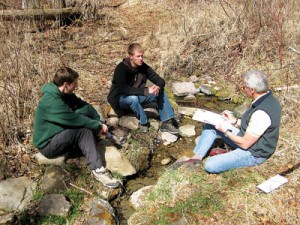Water conference poses fluid ideas

Photo courtesy of Waterlution. Colin Soskolne (right), a University of Alberta epidemiologist, was one of the participants in a Waterlution workshop at Pigeon Lake, Alta., in May 2009.
Working with a water conservation organization hasn’t gotten recent Mount Royal University graduate Alla Guelber in over her head yet, but the public relations graduate will still be holding her breath until after Oct. 24. By that point, the field tours – including locations in Cochrane, Calgary and the Columbia Ice Fields – she helped organize for the Canadian Water Innovation Lab will be over. “I just want to see it come together really well, I don’t want any little hiccups,” she said.
Waterlution, a “water learning” organization, tries to bring together youth aged 18-35 in different settings and work- shops to talk and learn about water with other industry and environmental stakeholders. Usually, workshops are held over a weekend, and are capped at no more than 30 people. This is the first time that the organi- zation will host such a large con- ference in Kananaskis Country over four days.
“It’s an ‘un-conference,’ because it’s not a traditional con- ference where it’s all about the guest speakers where everyone listens patiently and takes notes and then goes home,” Guelber said. “They want to be able to engage about these really controversial topics (such as water use in the oilsands or agricultur- al use in southern Alberta) in an atmosphere where participants have access and can engage directly. “There’s less of a separation; when a guest speaker or professor is up at their podium (at other conferences), you ask a few polite questions and that’s it. Whereas here, you really have a chance to push the discussion, to really grapple with these important questions, which is important when you’re dealing with water.”
Before everyone meets in Kananaskis Country – roughly 250 participants from across the country – there are another 50 participants, Guelber included, who will be meeting at the Banff Centre for three days. There, they learn how to facilitate group-learning experiences. Guelber said she’s excited to put that training to use immediately after at the “un-conference.” “Everything is geared toward pulling out the intelligence of the group,” she said. “Because people are coming from all these different personal, professional and academic backgrounds, they have all these different ideas and experiences about what can be improved on water management across Canada. So we generate all this new knowledge by encouraging people to share what they already know.” The planning, organization and fundraising required for an event of this scale means it probably won’t happen again any time soon, Guelber said, but she added Waterlution is still holding smaller workshops, including one in Fort McMurray in November. “No matter who you are, no matter what your degree is in, I think it’s important to, at the very least, have a basic under- standing of what your watershed is, and the basic issues in your watershed,” she said.
More information about Waterlution and its workshops can be found at www.waterlution.org.





